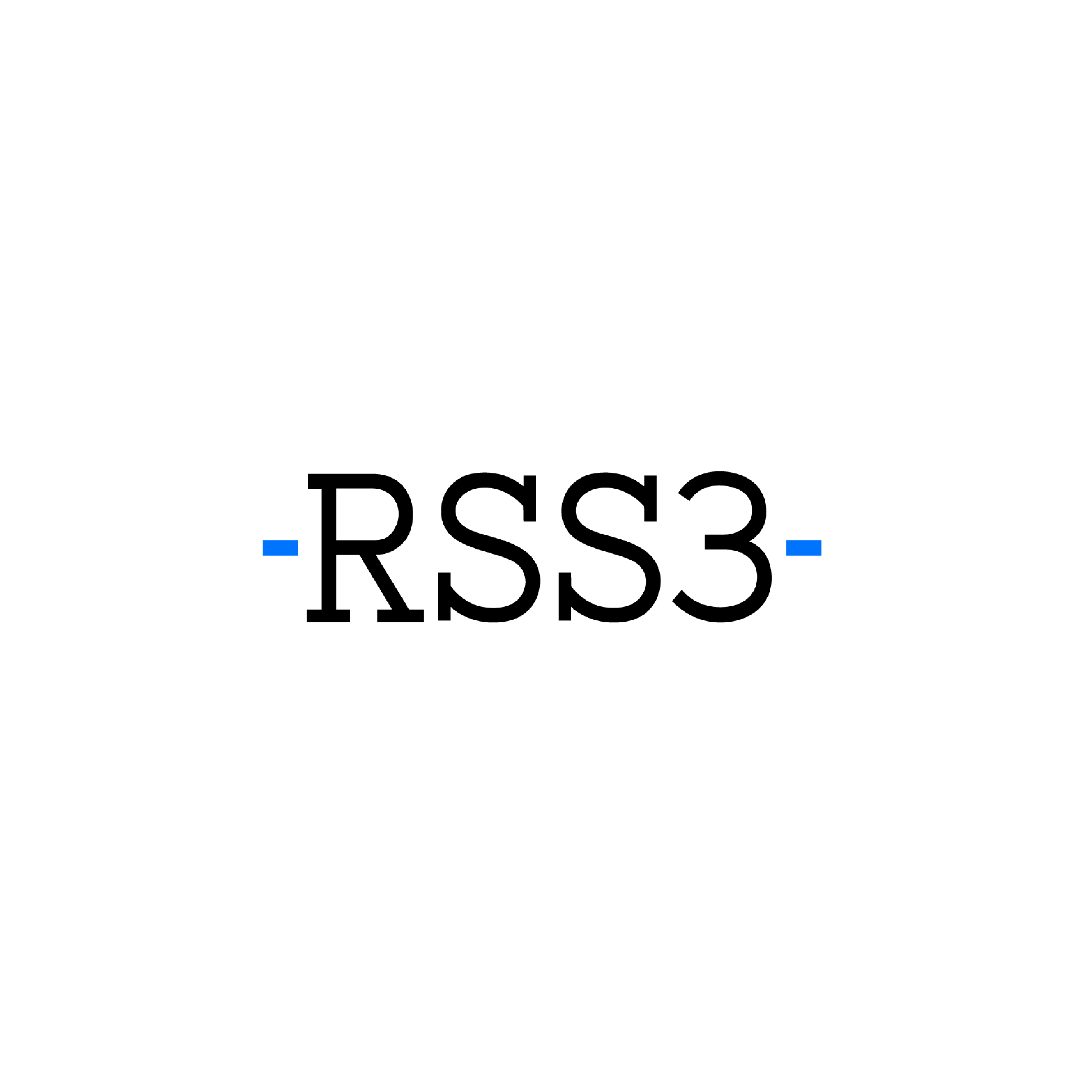-
 Bitcoin
Bitcoin $84,514.1750
0.43% -
 Ethereum
Ethereum $1,592.3644
0.42% -
 Tether USDt
Tether USDt $0.9999
0.02% -
 XRP
XRP $2.0784
-0.80% -
 BNB
BNB $592.3913
0.98% -
 Solana
Solana $134.5627
2.18% -
 USDC
USDC $0.9999
0.00% -
 Dogecoin
Dogecoin $0.1566
0.70% -
 TRON
TRON $0.2435
-1.92% -
 Cardano
Cardano $0.6196
0.09% -
 UNUS SED LEO
UNUS SED LEO $9.1443
0.41% -
 Chainlink
Chainlink $12.6177
1.51% -
 Avalanche
Avalanche $19.1279
-0.07% -
 Toncoin
Toncoin $3.0098
1.82% -
 Stellar
Stellar $0.2440
2.00% -
 Shiba Inu
Shiba Inu $0.0...01208
2.39% -
 Hedera
Hedera $0.1656
3.48% -
 Sui
Sui $2.1327
2.01% -
 Bitcoin Cash
Bitcoin Cash $342.4313
3.75% -
 Polkadot
Polkadot $3.7227
2.67% -
 Litecoin
Litecoin $75.9959
1.54% -
 Hyperliquid
Hyperliquid $16.7886
2.49% -
 Dai
Dai $1.0000
0.01% -
 Bitget Token
Bitget Token $4.3774
0.71% -
 Ethena USDe
Ethena USDe $0.9991
0.01% -
 Pi
Pi $0.6202
2.28% -
 Monero
Monero $216.8067
0.20% -
 Uniswap
Uniswap $5.2136
0.81% -
 Pepe
Pepe $0.0...07185
0.00% -
 OKB
OKB $50.3686
-0.17%
How does blockchain ensure that data cannot be tampered with?
Blockchain's immutability arises from its cryptographic hashing, chaining blocks, and decentralized architecture; altering a block necessitates altering the entire chain, making tampering prohibitively difficult and computationally expensive.
Mar 11, 2025 at 12:00 pm
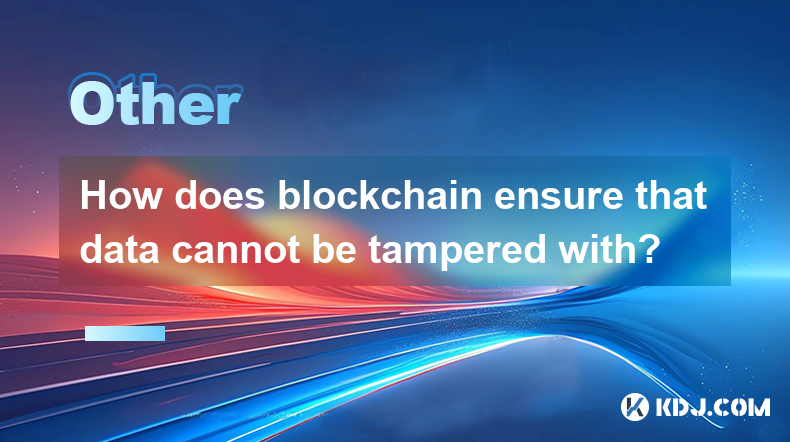
Key Points:
- Blockchain's immutability stems from its cryptographic hashing and chain structure.
- Each block contains a cryptographic hash of the previous block, creating a chain. Altering one block requires altering all subsequent blocks.
- Decentralization and distributed ledger technology prevent single points of failure and manipulation.
- Consensus mechanisms validate transactions and add new blocks, ensuring data integrity.
- While theoretically possible to alter data with immense computational power, the cost and difficulty are prohibitively high.
How Does Blockchain Ensure That Data Cannot Be Tampered With?
Blockchain technology's core strength lies in its ability to create a tamper-proof record of transactions. This seemingly magical property stems from a combination of cryptographic techniques, decentralized architecture, and consensus mechanisms. Let's delve into the specifics.
At the heart of blockchain lies the concept of a chain of blocks. Each block contains a set of validated transactions. Crucially, each block also includes a cryptographic hash of the previous block. A cryptographic hash is a one-way function; it's easy to compute the hash of a block, but incredibly difficult to reverse-engineer the block from its hash. This means even a tiny change to a block drastically alters its hash.
This chaining is the key to immutability. If someone attempts to alter a transaction in a specific block, the hash of that block will change. This, in turn, invalidates the hash of the following block, and so on, creating a cascading effect down the entire chain. The altered chain would be immediately detectable because its hash would differ from the accepted chain held by the network.
The decentralized nature of blockchain further enhances its security. Unlike traditional databases stored in a single location, a blockchain is replicated across numerous computers (nodes) in a network. This means there's no single point of failure or central authority that can easily manipulate the data. Any attempt to alter the blockchain would require compromising a significant majority of these nodes simultaneously, a practically impossible feat.
Consensus mechanisms, like Proof-of-Work (PoW) or Proof-of-Stake (PoS), play a vital role in maintaining data integrity. These mechanisms ensure that only valid transactions are added to the blockchain. They require a consensus among the network nodes before a new block is added, making it extremely difficult for malicious actors to introduce fraudulent transactions. The computational cost involved in achieving consensus further discourages tampering.
While it's theoretically possible to alter a blockchain, it would require an astronomical amount of computational power to overcome the cryptographic hashing and the consensus mechanisms. The cost involved, both in terms of energy consumption and computing resources, would far outweigh any potential gains from tampering. This makes tampering practically infeasible. The difficulty of altering the chain grows exponentially with its length, making older transactions even more secure.
The cryptographic techniques used in blockchain are constantly evolving, becoming more sophisticated and resistant to attacks. Researchers are continuously working to improve the security and efficiency of blockchain technology. The development of quantum-resistant cryptography is also an active area of research, aiming to future-proof blockchain against potential threats from quantum computers. This ongoing innovation ensures that blockchain technology remains at the forefront of secure data management.
Frequently Asked Questions:
Q: Can a blockchain be hacked?
A: While the blockchain itself is highly secure, vulnerabilities can exist in the software and applications that interact with it. These are not necessarily breaches of the blockchain's core functionality but rather weaknesses in the surrounding ecosystem. This highlights the importance of secure coding practices and robust security audits.
Q: What happens if a node is compromised?
A: Compromising a single node doesn't compromise the entire blockchain. Because the blockchain is distributed, other nodes will identify the discrepancy and reject the altered data from the compromised node. The consensus mechanism ensures the integrity of the chain despite the compromised node. A significant portion of the network would need to be compromised for a successful attack.
Q: How does blockchain compare to traditional databases in terms of data security?
A: Traditional databases are centralized and vulnerable to single points of failure and manipulation. Blockchains, being decentralized and immutable, offer significantly greater security against data tampering and unauthorized access. The cost and difficulty of altering a blockchain far exceed those of altering a centralized database.
Q: What are the limitations of blockchain's immutability?
A: While exceptionally secure, blockchain's immutability isn't absolute. Errors or malicious actions occurring before a transaction is added to a block can potentially lead to issues. Furthermore, the information within a block can be flawed if the data entered was inaccurate in the first place. Blockchain ensures the immutability of the recorded data, not necessarily the accuracy or validity of the data itself.
Q: Is it possible to delete data from a blockchain?
A: No, data cannot be deleted from a blockchain. This immutability is a core feature and a major security benefit. Once data is added to a block and the block is added to the chain, it becomes permanently part of the record.
Q: How does the cryptographic hashing contribute to data integrity?
A: Cryptographic hashing creates a unique fingerprint for each block. Any alteration to the block changes its hash, creating an easily detectable inconsistency in the chain. This chain of hashes acts as a tamper-evident seal, instantly revealing any attempt at data manipulation.
Disclaimer:info@kdj.com
The information provided is not trading advice. kdj.com does not assume any responsibility for any investments made based on the information provided in this article. Cryptocurrencies are highly volatile and it is highly recommended that you invest with caution after thorough research!
If you believe that the content used on this website infringes your copyright, please contact us immediately (info@kdj.com) and we will delete it promptly.
- Binance Remains the Top Crypto Exchange Despite Market Challenges in Q1 2025
- 2025-04-18 22:10:13
- Justin Sun Stands Firm on Ethereum Amid Market Dip
- 2025-04-18 22:10:13
- Ethereum (ETH) market trends have changed as big players made significant operations across the exchanges.
- 2025-04-18 22:05:13
- Binance Coin (BNB) is on track to reclaim one of its most fundamental price levels
- 2025-04-18 22:05:13
- The Ultimate Guide to Making Spectacular Profits by Investing in Ethereum (ETH) and Mutuum Finance (MUTM)
- 2025-04-18 22:00:12
- BYDFi Launches New Web3 Product—MoonX, a Smart Trading Tool Specifically Designed for MemeCoin Investors
- 2025-04-18 22:00:12
Related knowledge
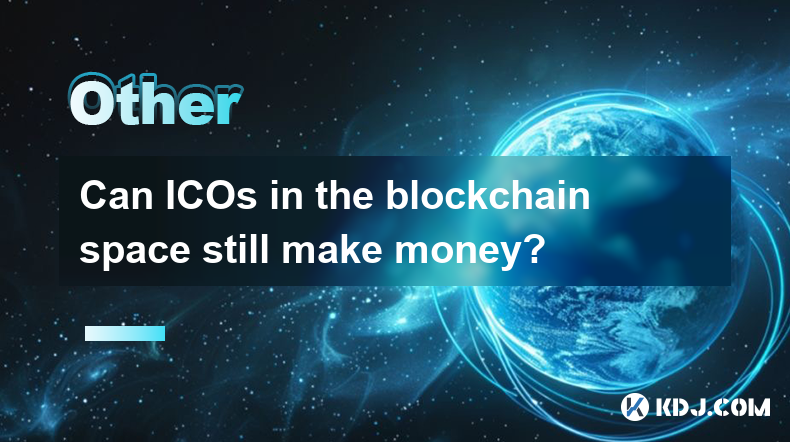
Can ICOs in the blockchain space still make money?
Apr 17,2025 at 08:29pm
The landscape of Initial Coin Offerings (ICOs) in the blockchain space has evolved significantly since their peak in 2017 and 2018. Despite the increased regulatory scrutiny and the rise of alternative fundraising methods like Security Token Offerings (STOs) and Initial Exchange Offerings (IEOs), ICOs can still be a viable way to raise funds and generat...
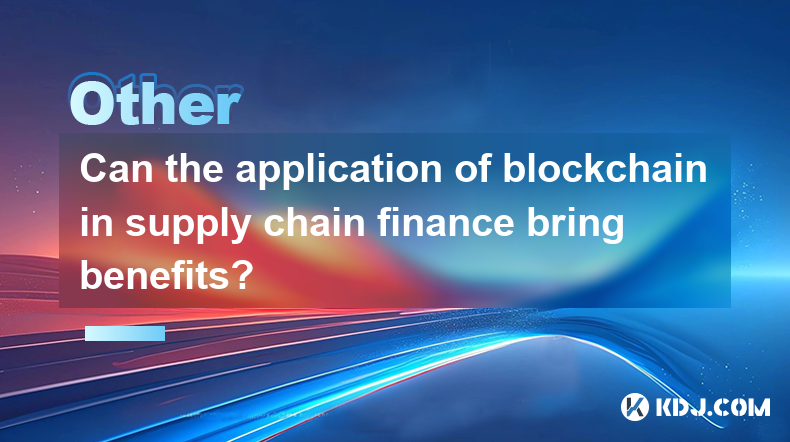
Can the application of blockchain in supply chain finance bring benefits?
Apr 15,2025 at 04:00pm
Can the application of blockchain in supply chain finance bring benefits? The integration of blockchain technology into supply chain finance has garnered significant attention in the cryptocurrency and financial sectors. This article explores how blockchain can potentially revolutionize supply chain finance, detailing its benefits and providing a compre...

Does the ranking of Chinese blockchain apps include cross-chain applications?
Apr 14,2025 at 04:00pm
The ranking of Chinese blockchain apps is a comprehensive evaluation that takes into account various aspects such as user base, transaction volume, and technological innovation. A pertinent question arises regarding whether these rankings include cross-chain applications. Cross-chain applications, which allow different blockchain networks to interact an...
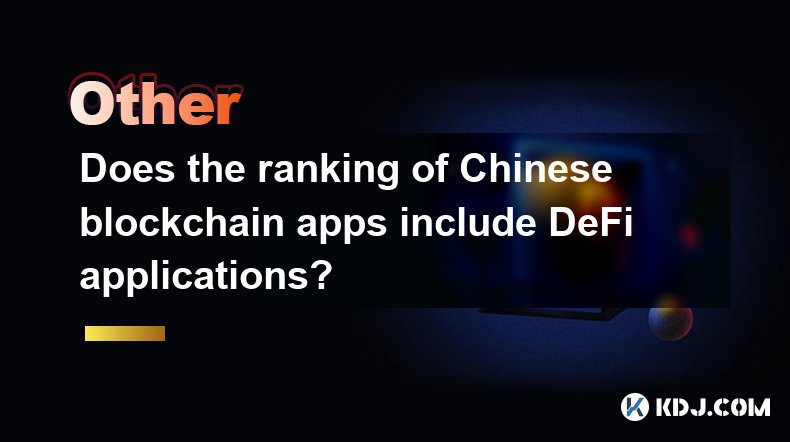
Does the ranking of Chinese blockchain apps include DeFi applications?
Apr 15,2025 at 06:57am
The ranking of Chinese blockchain apps is a comprehensive list that showcases the most popular and influential applications within the cryptocurrency ecosystem. One question that often arises is whether these rankings include DeFi applications. To answer this, we need to delve into the specifics of how these rankings are compiled and what types of appli...
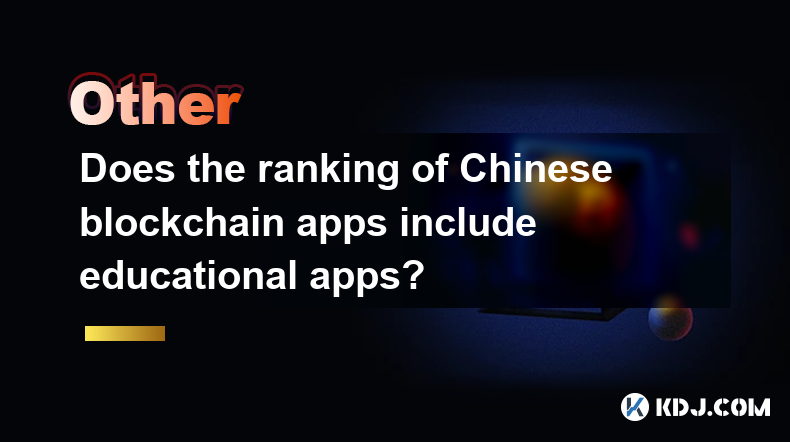
Does the ranking of Chinese blockchain apps include educational apps?
Apr 16,2025 at 03:35am
The ranking of Chinese blockchain apps often includes a variety of categories, from finance and gaming to social networking and beyond. One question that frequently arises is whether these rankings include educational apps. To address this, we need to delve into the specifics of how blockchain apps are categorized and ranked in China, and whether educat...
Does the ranking of Chinese blockchain apps include enterprise-level applications?
Apr 15,2025 at 06:42am
The ranking of Chinese blockchain apps often includes a variety of applications, ranging from consumer-focused to enterprise-level solutions. Understanding the scope and criteria for these rankings is essential to determine if enterprise-level applications are included. This article delves into the specifics of how Chinese blockchain app rankings are co...

Can ICOs in the blockchain space still make money?
Apr 17,2025 at 08:29pm
The landscape of Initial Coin Offerings (ICOs) in the blockchain space has evolved significantly since their peak in 2017 and 2018. Despite the increased regulatory scrutiny and the rise of alternative fundraising methods like Security Token Offerings (STOs) and Initial Exchange Offerings (IEOs), ICOs can still be a viable way to raise funds and generat...

Can the application of blockchain in supply chain finance bring benefits?
Apr 15,2025 at 04:00pm
Can the application of blockchain in supply chain finance bring benefits? The integration of blockchain technology into supply chain finance has garnered significant attention in the cryptocurrency and financial sectors. This article explores how blockchain can potentially revolutionize supply chain finance, detailing its benefits and providing a compre...

Does the ranking of Chinese blockchain apps include cross-chain applications?
Apr 14,2025 at 04:00pm
The ranking of Chinese blockchain apps is a comprehensive evaluation that takes into account various aspects such as user base, transaction volume, and technological innovation. A pertinent question arises regarding whether these rankings include cross-chain applications. Cross-chain applications, which allow different blockchain networks to interact an...

Does the ranking of Chinese blockchain apps include DeFi applications?
Apr 15,2025 at 06:57am
The ranking of Chinese blockchain apps is a comprehensive list that showcases the most popular and influential applications within the cryptocurrency ecosystem. One question that often arises is whether these rankings include DeFi applications. To answer this, we need to delve into the specifics of how these rankings are compiled and what types of appli...

Does the ranking of Chinese blockchain apps include educational apps?
Apr 16,2025 at 03:35am
The ranking of Chinese blockchain apps often includes a variety of categories, from finance and gaming to social networking and beyond. One question that frequently arises is whether these rankings include educational apps. To address this, we need to delve into the specifics of how blockchain apps are categorized and ranked in China, and whether educat...

Does the ranking of Chinese blockchain apps include enterprise-level applications?
Apr 15,2025 at 06:42am
The ranking of Chinese blockchain apps often includes a variety of applications, ranging from consumer-focused to enterprise-level solutions. Understanding the scope and criteria for these rankings is essential to determine if enterprise-level applications are included. This article delves into the specifics of how Chinese blockchain app rankings are co...
See all articles





















































































